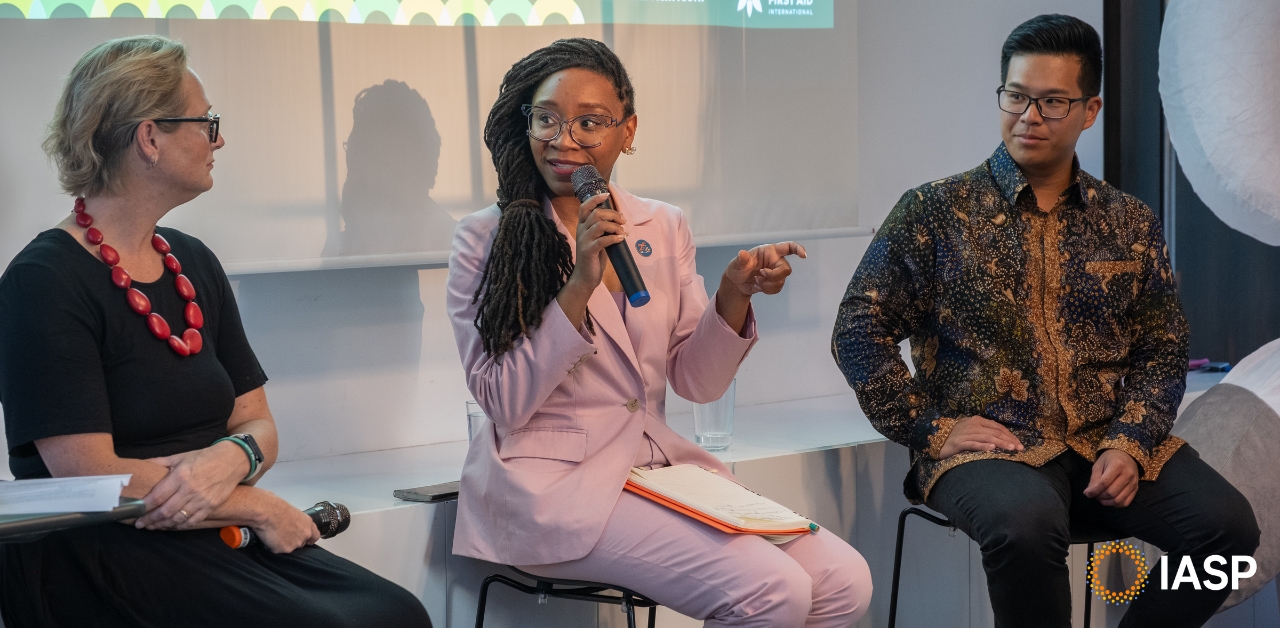At the IASP 33rd World Congress held in June in Vienna, Mental Health First Aid International fully embraced its role as Mental Health Partner, celebrating 25 years of global innovation and reach. From its early beginnings in Australia, MHFA International has grown into a movement that spans 35 countries, with more than 8 million people trained with the skills to intervene early and assist in a crisis.
Dr Jakqui Barnfield, MHFA’s Executive Director of International Programs, Quality and Research, emphasised the importance of locally led approaches. “What began as a simple idea – that anyone can support the mental health of those around them – has become a global network of circles of safety,” she said. “Our focus now is ensuring that Mental Health First Aid is responsive to cultural contexts, especially in low and middle-income countries and low-resource countries more broadly.”
This theme of localisation and inclusion carried through to the Congress’s Fireside Chat, Building Global Capacity for Mental Health and Suicide Prevention in LMICs. Moderated by Dr Barnfield, with guest speakers Tramaine EL-Amin, Vice President of Mental Health First Aid USA, and IASP Vice President Dr Sanderson Onie, the conversation explored how to adapt evidence-based programs to local contexts, address cultural stigma, and scale peer-led initiatives in under-resourced settings. The evening presented a number of examples from around the world, where mental health professionals, community leaders, and advocates are rethinking how care is delivered and placing trust, cultural relevance, and community partnership at the heart of their work. Sustainable mental health solutions must be rooted in trust, cultural understanding, and community collaboration.
Mental health strategies must be adapted to the cultural and social realities of each community. Programs like Mental Health First Aid demonstrate how evidence-based practices can be blended with local wisdom. In Australia, the Aboriginal and Torres Strait Islander Program is developed and delivered by First Nations peoples. This culturally led and responsive training recognises existing strengths and adds to the skills already in the community, equipping individuals to recognise mental health problems, respond safely, and connect people to support in ways that are respectful, relevant and grounded in culture.
Faith plays a complex role in mental health. In many communities, religious beliefs prevent suicide attempts, while in others, they discourage people from seeking help. Rather than challenge these beliefs, Dr Sanderson Onie emphasised working within them to foster compassion and support. Tramaine highlighted an interfaith coalition in Philadelphia that has trained faith leaders in Mental Health First Aid, empowering them to have open conversations in their congregations and shift the culture toward openness.
In many African countries, the stigma surrounding mental health is reinforced by the physical structure of healthcare systems, where psychology and psychiatry services are often housed together. This deters people from seeking help. Integrating psychological services into general healthcare settings was proposed as a way to reduce stigma and increase access. Corporate involvement in mental health is also evolving. While environmental and governance issues have long dominated ESG agendas, the social dimension is gaining ground. Some corporations are now investing in both internal mental health support and external community partnerships. However, the Fireside Chat highlighted that one-off donations are not enough. Long-term partnerships and funding for operating costs are essential to ensure sustainability. Representation was another key theme. People are more likely to engage when they see themselves reflected in mental health programs. Vulnerability, trust, and healing flourish when communities feel seen, heard, and respected.
As Dr Jakqui Barnfield powerfully concluded, “True partnership means walking alongside, not ahead. In supporting lower resource countries, we must walk alongside them, respecting their rich histories, their hopes, and their voices that deserve to be heard.”
Thank you to Mental Health First Aid International for hosting such a valuable and insightful evening, providing the opportunity to delve into nuanced approaches to meet the needs of individuals around the world.




